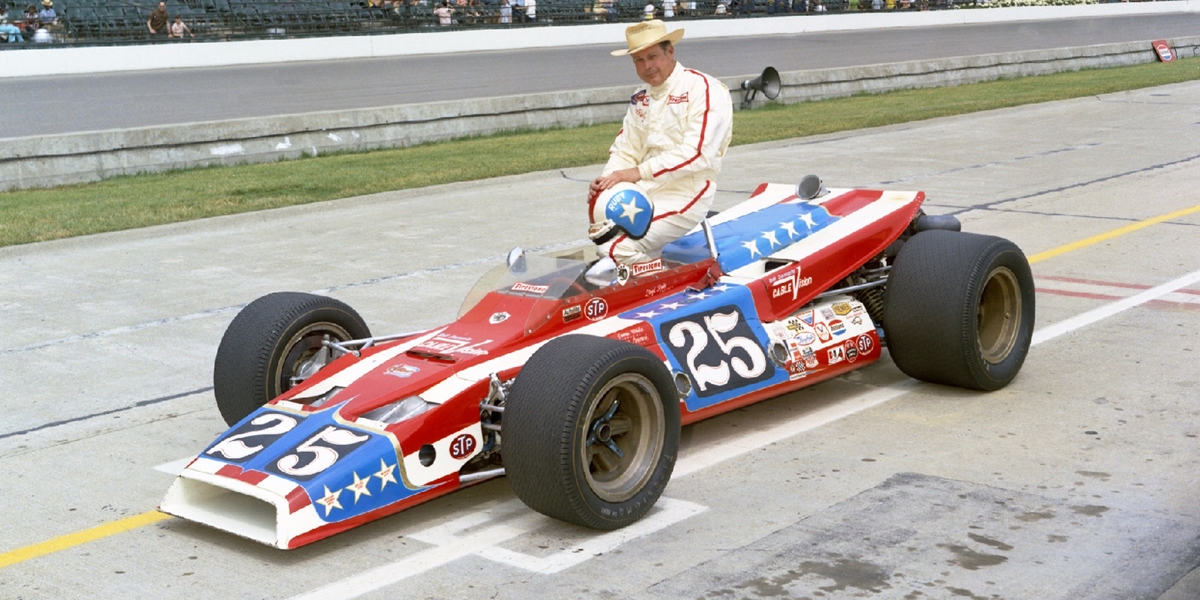
Humble Ruby Glimmered Like Precious Gem among Indianapolis 500 Peers, Fans
May 14, 2020 | By Donald Davidson, Indianapolis Motor Speedway
Slow-talking, fast-driving golf aficionado Lloyd Ruby was among the most beloved and respected veterans in the entire history of the Indianapolis 500.
As three-time Formula One World Champion Sir Jackie Stewart observed: "He was completely out of context with what one would expect a driver to be. Nobody who saw him, if they didn't know, would ever imagine he was a driver until he stepped into the cockpit.'"
Forever to be remembered as the eternal "hard-luck driver from Wichita Falls, Texas," it is generally felt, even by the other drivers, that Ruby should have won the "500" at least two or three times. While he did manage to salvage 11 finishes of 12th or higher in his 18 consecutive "500" starts between 1960 and 1977 – including a third place in 1964 – it's the "ones that got away" that everyone remembers.
Ruby led the "500" in five out of six starts between 1966 and 1971 only to have something either break or cause him a delay. And there were plenty of other years when a late-race problem would rob him of a high finish.
A standout in post-World War II midget car racing in the Southwest while still in his teens, Ruby managed to win seven USAC National Championship races, including three at Milwaukee and two at Phoenix. Also winner of the pole for the first Ontario 500 in 1970, Ruby was never really given credit for his proficiency on road courses. In 1959, he placed second in the fledgling USAC Road Racing series and was third (behind Roger Penske and Dan Gurney) in 1962. He later became a key member of Ford's major sports car effort, sharing the winning GT40 with England's Ken Miles in the 1965 Daytona Continental, and in both the 24 Hours of Daytona and 12 Hours of Sebring in 1966.
It constantly confounded Ruby’s colleagues that he seemed to be able to do everything with such ease.
"I was always amazed," recalled Mario Andretti, "at how quickly he was able to pick up the pace. It didn't matter where we were, at the Speedway, a high-banked track, or a road course, as soon as hot laps started – even when we were merely tire-testing – his second time by the start/finish line would usually be a real eye-opener. How could he do that?"
And Ruby was casual beyond belief. Red-flag situations at racetracks, and the inevitable rain delays, never seemed to bother him. That is because, for some unfathomable reason, they simply didn’t bother him.
"Ole Rube" always seemed very much at peace with the world and was even described by some as being "spiritual." He was a man of extraordinary integrity and principles.
With all of his success and notoriety, he never moved away from Wichita Falls, some of his closest friends being people with whom he had gone to school. In early May 1976, with any hope of a second consecutive"500" with fellow Texan Johnny Rutherford at Team McLaren having evaporated, he told his longtime friend and chief mechanic, Mike Devin, to go ahead and tow the "old standby" 1973 Eagle back from Phoenix. No sooner had Ruby entered his hotel room the following evening than the phone rang. It was Vel Miletich (business partner of Parnelli Jones), offering him Al Unser's backup car.
Incredibly, Ruby turned it down, feeling it would be unfair to his friends who had worked so hard. He was 48 at the time and obviously near the end of his career, but his allegiance to his friends came before what, on paper, seemed like a much stronger chance to win.
Even during the final months of his life, Ruby was very philosophical. On the day before he was to enter the hospital for yet another operation, a caller commented on how bright and breezy he sounded. "Aw, hell," drawled Ruby, "the way I look at it, it's just another concrete wall."
Not only was Ruby so beloved by the fans, he was held in extraordinarily high esteem by some of the sport's greatest names, one veteran once declaring that, in his opinion, Ruby had adapted to the Indianapolis Motor Speedway better than any other driver he had ever run against.
The memories of the affable "gentleman from Wichita Falls," either in a race car or leaning up against a wall, arms folded, cowboy hat tipped slightly forward and one Western boot crossed in front of the other, toe to the ground, will not soon fade.
"I don't know what drink they serve in the afterlife," said Dan Gurney, "but I sure hope they offer Lloyd a big glass of milk."